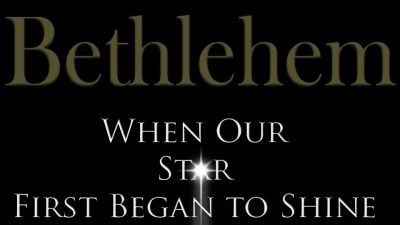I know a little about mine. I've even sent away to have my DNA tested to see if the things I have heard about my family are as real in my DNA record as it is in the stories my family has told over the years!
On closer examination, my DNA's story matches some of the stories my brother has told me about our ancestors. We have some outstanding people in our family story: good men, great leaders, strong women, and a lot of people very committed to Jesus. But, like a lot of people, we have some doozies! Our family is full of scoundrels, whacky characters, eccentric loners, along with several generations of marauding and pillaging invaders.
The more most of us examine our past, the more we realize that our family tree is full of exciting stories. One of our stories makes people smile. It involves the marriage of my grandmother. Her wedding made me my own cousin. Her story brings joy to the hard realities of our family's grief. My dad, her son, died when I was 25. Three-and-half years later, my mom re-married another godly man. My Granny wasn't very thrilled at the time. Several years later, however, her husband, my dad's father, died. After a year or so passed, my step-father's father-in-law began courting my grandmother. Next thing you know, my step-father's father-in-law married my grandmother! Got all that? Suddenly, I became my own cousin. (Yes, my family tree has a few roots in Oklahoma!)
Family stories, whether serious, tragic, or humorous, are essential. Each story reveals something about the people who made us who we are.
The Bible blesses us with the genealogies of key people in our spiritual heritage. These genealogies tell us something about our spiritual family. For Gentile Christians, God grafted us into the family tree of Abraham (Romans 11:17-18). The Bible is both a story of faith and a story of our physical family for Jewish believers. When the Bible lists genealogies, these are the people who make up our spiritual family tree because we are all spiritual descendants of Abraham (Galatians 3:29).
Today, James' video focuses on Jesus and his ancestors. James reminds us that Jesus is the fulfillment of God's promises, and the genealogy begins the great story of God's grace. As you watch, think of the implications that the people in Jesus' genealogy have for your story - how they show that you belong in Jesus' story, too!
The gospel of Matthew emphasizes Jesus' connection to Abraham and God's promise to bring redemption through one of Abraham's descendants (Genesis 12:1-3). Matthew also emphasizes Jesus' relationship to King David and God's promise to deliver a king who would be David's descendant and reign on David's throne forever (1 Kings 9:5; Matthew 1:17; 9:27; 12:23; 15:22). God fulfills his promises to both Abraham and David by sending Jesus as the descendant of both of these great men (Matthew 1:17). All of God's promises to Abraham and David find their fulfillment in Jesus (2 Corinthians 1:19-20).
Matthew very carefully lists the people in Jesus' family tree. Matthew wants us to know that this is the perfect list of Jesus' family tree by dividing the groupings in his list into three groups of fourteen generations.[NOTE] As we go through this list, we notice some remarkable truths.
Matthew didn't sanitize the list. He left in the scoundrels, the unfaithful, the whacky folks, and the sinful ones. There are no hidden skeletons in Jesus' closet; Matthew chose to reveal the embarrassing ancestors along with the heroes of faith, victorious warriors, and women who won their way into God's story of redemption. This genealogy reminds us of remarkable faith, both Jews and Gentiles, righteous people, and people having questionable moral histories. Jesus' genealogy is full of real people in whom faith triumphed and through whom God kept his promises!

Why is knowing all this about Jesus' family tree so important?
Matthew shows us the good news of God even before he tells Jesus' full story. He does this by showing us the people God has used to get us to Jesus. That is not just good news for some of us; it is great news for all of us! We read this list and know we belong. No matter our backgrounds, no matter our victories or failures, we can find someone like us in Jesus' ancestry. We belong to Jesus' family not just because we've been reborn as God's children (John 1:11-13; 3:1-7), but also because God takes people like us and brings redemption to them and through them.
In our journey through the Bible, we now shift from God's promises to Abraham into the fulfillment of these promises in Jesus. As we do, we can rejoice! God shared his message, love, and redemption with people like us.
As we meet the people in Matthew 1, we realize that we belong in this story. We recognize the people in Matthew's genealogy as our family. So, as we continue our journey, let's invite Jesus to transform our lives to be more like his. In a good story, the personality of a character grows, develops, and changes over time. We want God to capture our personal stories into Jesus' story. We want our lives to be part of Jesus' unfolding story of redemption, and then we want to share that redemption with others!
Let's not only follow the Bible's story of Jesus but also make sure we are a part of it!
[NOTE] Interestingly, Matthew takes a familiar genealogy and lists 14 generations between Abraham, David, and the Exile (Matthew 1:17). Every devoted Jew at this time would know that there were more than 14 generations, but Matthew was using numbers to say something significant. Seven is the number of perfection. Each of these lists is twice the perfect number of generations. There are three sections of the genealogy, with three often being the divine number of perfection. So, what Matthew gives us is symbolic: three times twice the number for a perfect genealogy. That is his way of saying, "Notice who is on this list! If you do, you will see that Jesus comes to bring us to God no matter our pedigree, background, race, or gender."













Comments
Have thoughts on this article? Leave a comment